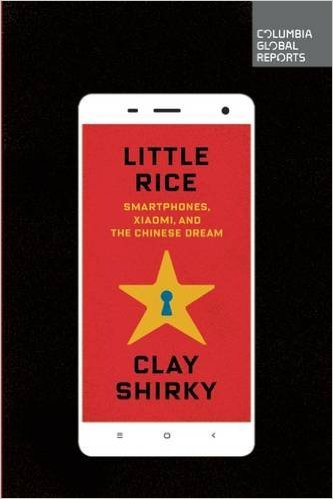Little Rice: Smartphones, Xiaomi, and The Chinese Dream
26 Sep 2016
Clay Shirky’s easy style of writing takes you on a trip through the busy corridors of a tech mall in Shenzhen to discover how China became the economic powerhouse it is today, and how its citizens are still struggling through poverty and climbing to the middle class.
Xiaomi, the young maker of a successful line of Chinese-designed and Chinese-made smartphones, is the focal point, but is only the beginning of a much larger story, a story about China’s economic rise, its struggle to achieve economic freedom while maintaining political control, a story about the changing relation between hardware and software and which is the main seller of products today, a story about the new reality of selling products online and directly to customers, and a story about the maker movement and its effect in a country where they actually make everything.
This might seem like a lot of stories for a book with only 130 pages, but Shirky gets to the point directly and dives deep enough into any of those topics to offer the background needed to understand how all those stories are connected to each other. I really enjoyed how the book is seem to be written for the Internet-age, where there’s so much other stuff to read. The book doesn’t repeat itself, just gets to the point, illustrates it completely and thoroughly and moves on.
The book certainly opened my appetite for more books and material on China’s modern history, economic rise, and the possibilities for its near future.
Highly Recommended.
Quotes from the book
Page 15
The first day the note was offered, it sold out in 3 minutes. Xiaomi raised $41 million in their first round of funding in 2010. As 2014 closed, it was not yet 5 years old and is valued at $45 billion. It is, by several metrics, the most valuable startup ever.
Page 16
To give you an idea of the scalpel-like removal of the free play of ideas from public conversation, the government agency in charge of media has banned both time travel and the use of puns in certain kinds of writing, as both forms allows for alternate meanings that might threaten government narratives.
Page 25
The people who flood online conversations with pro-Beijing sentiment are called the 50 Cent Party, on the, appalling but false, idea that they are paid half a yuan for every post. But even this is not enough, so the government is now recruiting members of the Communist Youth League to be part of a volunteer online propaganda group, each of whom would agree to participate in at least three “sunshine comment” campaigns a year.
Page 43
In January 2015, it sold out of the Mi note, it’s priciest phone to that point, in three minutes. In May, and Mi Bands, Xiaomi’s Fitness tracker, sold out in India and 7 Seconds. Xiaomi was given a Guinness world record for selling over 2 million phones in 12 hours on Singles day, beating its previous record. In the case of the 7-second Indian sale, only 1000 Mi bands were offered.
Page 49
The concern was that instead of buying phones from Xiaomi and re-selling them, as China mobile does, the knockoff stores would sell fake phones of the Sam Song/Svmsmvg sort. The irony of a Chinese electronics firm worrying about copying was lost on no one.
Page 50
Michael Anti, a Chinese blogger who’s often censored by Chinese authorities, notes that many social media services are required to have their servers in Beijing, to simplify surveillance.
Page 91
China used more cement in the first three years of this decade than the US used in the 20th century. Much more 6.6 billion tonnes to 4.5
Page 119
Xiaomi is bad news for the models of manufacturing that starts with Hardware first, rely on unit sales without engaging users, and sell things in store. There will always be some products that have to be made and sold that way, but everything with a chip in it (and increasingly sizable subset of everything) is a good candidate to be sold Services-first, and online. As we know from companies like Tesla, even cars, the most valuable manufactured item anyone buys, can be sold online with only perfectionist impulses keeping local dealerships free from competition.
Page 120
The car company Daimler decided to try a flash sale of their two-passenger city car on WeChat and sold 388 of them in three minutes.
Page 124
China is bigger than anybody, but it’s not bigger than everybody.

